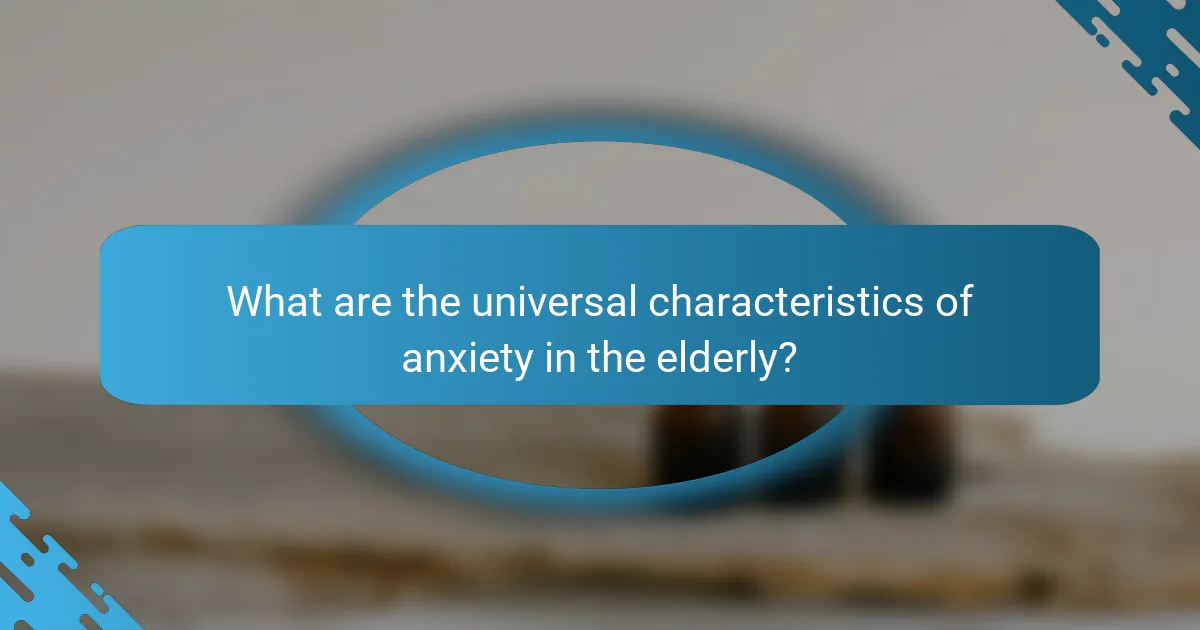Irrational fear in seniors can lead to significant anxiety and isolation, impacting their quality of life. This article explores the unique factors contributing to these fears, characteristics of anxiety in the elderly, and effective coping strategies. It also highlights the role of caregivers in supporting seniors and addresses common mistakes in managing these fears. Understanding these aspects is crucial for promoting well-being among older adults.

What is the meaning of irrational fear in seniors?
Irrational fear in seniors refers to excessive anxiety that can lead to feelings of isolation. This fear often stems from health concerns, loss of independence, or changes in social dynamics. Seniors may experience this fear uniquely due to their life stage, making coping strategies essential. Effective approaches include therapy, social engagement, and mindfulness practices to alleviate anxiety and promote well-being.
How does irrational fear manifest in elderly individuals?
Irrational fear in elderly individuals often manifests as heightened anxiety, leading to social isolation and avoidance behaviours. Common triggers include health concerns, loss of independence, and environmental changes. Seniors may exhibit symptoms such as increased heart rate, sweating, or panic attacks. Coping strategies include therapy, support groups, and relaxation techniques, which help manage anxiety and encourage social interaction.
What are common triggers of irrational fear among seniors?
Common triggers of irrational fear among seniors include health concerns, loss of independence, social isolation, and financial insecurity. These fears often stem from changes in physical health, cognitive decline, or the death of peers. As a result, seniors may experience heightened anxiety and withdrawal from social interactions. Understanding these triggers is essential for developing effective coping strategies that can alleviate their fears and promote mental well-being.
What role do health issues play in irrational fear?
Health issues can significantly exacerbate irrational fear, particularly among seniors. Chronic conditions, pain, and cognitive decline can heighten anxiety and lead to isolation. This isolation may intensify feelings of helplessness, further fueling irrational fears. For instance, seniors with health issues may develop a fear of falling, which can restrict their mobility and social interactions. Understanding these connections is crucial for developing effective coping strategies that address both health concerns and irrational fears.
How does social isolation contribute to irrational fear?
Social isolation significantly contributes to irrational fear by intensifying feelings of anxiety and helplessness. When seniors experience isolation, they often lack social support, which can exacerbate their fears. This lack of interaction can lead to distorted thinking patterns, making them more susceptible to irrational fears. Additionally, isolation can create a feedback loop where fear leads to further withdrawal, reinforcing the cycle of anxiety. Understanding this relationship is crucial for developing effective coping strategies for seniors facing these challenges.

What are the universal characteristics of anxiety in the elderly?
Anxiety in the elderly often manifests as irrational fear, social isolation, and difficulty coping. Common characteristics include excessive worry, restlessness, and physical symptoms like increased heart rate. Seniors may experience unique challenges such as cognitive decline, which can exacerbate feelings of anxiety. Understanding these characteristics is crucial for developing effective coping strategies tailored to their needs.
How does anxiety affect daily life for seniors?
Anxiety significantly impacts daily life for seniors by limiting social interaction and increasing feelings of isolation. Seniors may experience irrational fears that hinder their ability to engage in routine activities. This can lead to a decline in mental and physical health. Coping strategies like mindfulness and social support are essential for managing anxiety.
What are the physical symptoms of anxiety in older adults?
Physical symptoms of anxiety in older adults include increased heart rate, muscle tension, fatigue, and sleep disturbances. These symptoms can manifest as physical discomfort, leading to further isolation. Anxiety may also exacerbate existing health conditions, creating a cycle of fear and physical decline. Recognising these symptoms is crucial for timely intervention and support.

What unique factors influence irrational fear in seniors?
Unique factors influencing irrational fear in seniors include cognitive decline, social isolation, and health-related anxieties. Cognitive decline can impair judgment, leading to exaggerated fears. Social isolation exacerbates feelings of loneliness, increasing anxiety levels. Health-related anxieties stem from chronic conditions or fear of illness, creating irrational fears about safety and well-being. Understanding these factors can aid in developing effective coping strategies for seniors.
How does cognitive decline affect irrational fears?
Cognitive decline can exacerbate irrational fears by impairing judgment and increasing anxiety. Seniors may struggle to distinguish between real threats and imagined dangers. This heightened state of fear can lead to social isolation, as individuals withdraw from situations that trigger anxiety. Coping strategies such as mindfulness and gradual exposure can help mitigate these fears, fostering a sense of control and reducing isolation.
What is the impact of past trauma on current fears?
Past trauma significantly influences current fears by creating lasting anxiety and isolation. Individuals may develop irrational fears as a coping mechanism, which can hinder their ability to engage socially. Studies indicate that seniors with unresolved trauma often experience heightened anxiety levels, impacting their quality of life. Effective coping strategies, such as therapy and support groups, can help mitigate these fears and promote emotional well-being.

What rare attributes are associated with irrational fear in elderly populations?
Rare attributes associated with irrational fear in elderly populations include heightened sensitivity to environmental changes, unique cultural influences on fear perception, and specific cognitive distortions. These attributes can lead to increased anxiety levels and social isolation. Research indicates that elderly individuals may develop fears related to losing independence or facing health decline, which are less common in younger demographics. Understanding these unique attributes is crucial for developing effective coping strategies tailored to seniors.
How do cultural factors shape irrational fears in seniors?
Cultural factors significantly influence irrational fears in seniors by shaping their perceptions and responses to anxiety. Social norms and values can amplify fears related to health, safety, and isolation. For instance, cultures that emphasise independence may lead seniors to fear loss of autonomy, while those that prioritise community can foster anxiety about being a burden. Additionally, cultural narratives around aging can reinforce negative stereotypes, increasing feelings of isolation. Understanding these dynamics allows for tailored coping strategies that address specific cultural contexts, enhancing emotional resilience in seniors.
What role do medication side effects play in irrational fears?
Medication side effects can significantly contribute to irrational fears in seniors. These side effects may trigger anxiety or exacerbate feelings of isolation. For instance, certain medications can cause dizziness or confusion, leading to heightened fear of falling or losing control. Understanding these effects is crucial for developing effective coping strategies, such as medication reviews or alternative therapies. Addressing these side effects can help reduce irrational fears and improve overall well-being.

What coping strategies can help seniors manage irrational fear?
Coping strategies for seniors managing irrational fear include mindfulness, social engagement, and professional support. Mindfulness practices, such as meditation and deep breathing, help reduce anxiety by promoting relaxation. Social engagement through community activities combats isolation and fosters a sense of belonging. Seeking professional support, such as therapy, provides tailored coping techniques and emotional guidance. These strategies empower seniors to manage irrational fears effectively and improve their overall well-being.
How can therapy be an effective tool for coping?
Therapy can effectively help seniors cope with irrational fears by providing support and strategies. It fosters emotional expression, promotes understanding of anxiety, and encourages social interaction. Cognitive Behavioral Therapy (CBT) specifically targets irrational thoughts, helping to reshape them. Group therapy offers a sense of community, reducing feelings of isolation. Regular therapy sessions can enhance coping mechanisms, leading to improved mental health outcomes.
What types of therapy are most beneficial for seniors?
Cognitive-behavioural therapy, mindfulness-based therapy, and art therapy are beneficial for seniors facing irrational fears. These therapies address anxiety, promote coping strategies, and reduce isolation. Cognitive-behavioural therapy helps reframe negative thoughts, while mindfulness techniques enhance emotional regulation. Art therapy encourages self-expression, fostering connection and reducing feelings of loneliness.
What role do support groups play in alleviating fear?
Support groups significantly alleviate fear by providing social connection and shared experiences. They create a safe space for seniors to express their anxieties, reducing feelings of isolation. Engaging in group discussions fosters understanding and encourages coping strategies. Research indicates that participation in support groups can lead to decreased anxiety levels and improved emotional well-being among seniors.
How can mindfulness techniques assist in coping?
Mindfulness techniques can significantly assist seniors in coping with irrational fear and anxiety. These practices promote present-moment awareness, reducing feelings of isolation and enhancing emotional regulation. Mindfulness-based interventions, such as meditation and deep breathing, have been shown to decrease anxiety levels by fostering a sense of calm. As a result, seniors can experience improved well-being and a greater ability to manage stress. Regular mindfulness practice can lead to long-term benefits, including increased resilience and a more positive outlook on life.

What practical steps can caregivers take to support seniors?
Caregivers can support seniors by addressing irrational fears through communication, companionship, and structured routines. Establishing open dialogue allows seniors to express their anxieties, fostering trust. Regular social interactions can reduce feelings of isolation, enhancing emotional well-being. Implementing consistent daily routines provides a sense of stability, which can alleviate anxiety. Encouraging participation in community activities or hobbies can also promote engagement and connection.
How can caregivers create a safe environment?
Caregivers can create a safe environment by minimising hazards and ensuring emotional support for seniors. Establishing clear routines fosters a sense of security. Regular assessments of the living space can identify potential dangers, such as trip hazards or inadequate lighting. Additionally, promoting social interaction helps reduce feelings of isolation, which can exacerbate irrational fears. Engaging seniors in activities that encourage connection can significantly improve their mental well-being.
What communication strategies are effective in addressing fears?
Effective communication strategies for addressing fears include active listening, validation of feelings, and providing clear information. Seniors often experience irrational fears linked to anxiety and isolation. Using empathetic language fosters trust and encourages open dialogue. Additionally, sharing coping strategies tailored to their experiences can empower seniors to manage their fears more effectively. Regular follow-ups can reinforce support and reduce feelings of isolation.

What common mistakes should be avoided when addressing irrational fears?
Avoiding common mistakes when addressing irrational fears involves understanding their nature and employing effective coping strategies. One key mistake is dismissing the fear as irrational without acknowledging the person’s feelings. This can lead to increased anxiety and isolation. Another mistake is not providing a safe space for discussion, which can hinder open communication. Additionally, using invalidating language can exacerbate the fear. Encouraging gradual exposure to the fear, rather than forcing confrontation, is essential. Finally, neglecting the importance of professional support can prevent effective coping.
How can caregivers ensure they do not minimize the fears of seniors?
Caregivers can ensure they do not minimize the fears of seniors by actively listening and validating their feelings. Acknowledging fears without judgment fosters trust. Engaging in open conversations allows seniors to express their concerns, making them feel heard. Providing reassurance and discussing coping strategies can help alleviate anxiety. Encouraging social interactions combats isolation, which often amplifies irrational fears.
What are the best practices for fostering open dialogue about fears?
To foster open dialogue about fears, create a safe environment where seniors feel comfortable sharing their feelings. Encourage active listening and validate their experiences. Use open-ended questions to facilitate discussion. Provide reassurance that their fears are common and can be addressed. Offer coping strategies tailored to their unique needs, such as mindfulness techniques or support groups. Regular check-ins can help maintain ongoing conversations about their fears.
How can seniors empower themselves to face their fears?
Seniors can empower themselves to face their fears by adopting coping strategies that promote resilience. Engaging in social activities reduces isolation, while mindfulness practices enhance emotional regulation. Seeking support from peers or professionals can also provide valuable perspectives. Building a routine that includes physical activity and mental exercises fosters confidence and reduces anxiety.